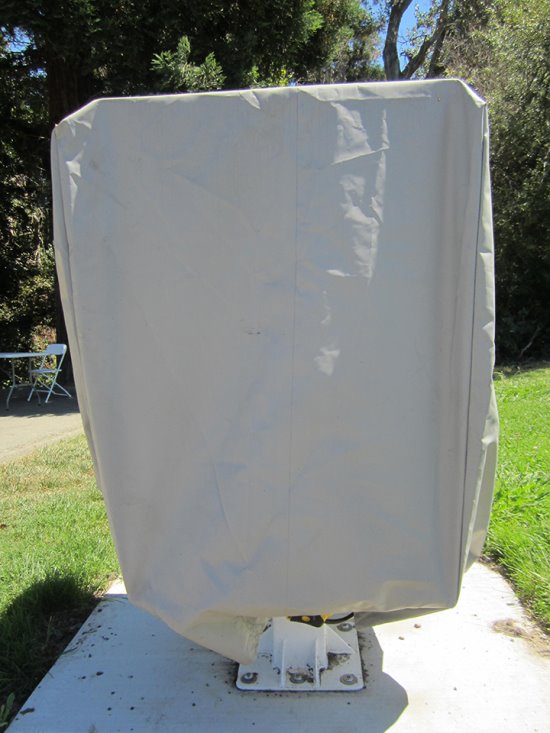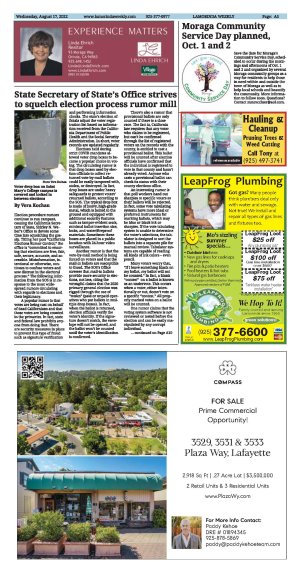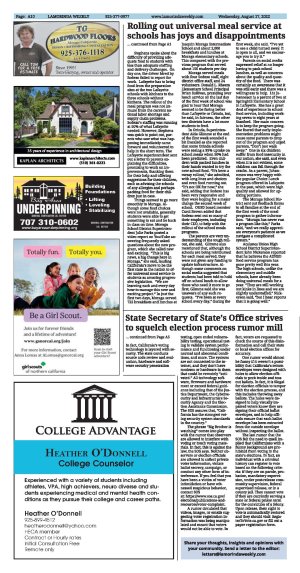| | Published August 17th, 2022
| State Secretary of State's Office strives to squelch election process rumor mill
| | | By Vera Kochan |  | | Voter drop box on Saint Mary's College campus is covered and locked in between elections Photo Vera Kochan |
Election procedure rumors continue to run rampant, causing the California Secretary of State, Shirley N. Weber's Office to devote some time into squelching the gossip. Titling her post "California Elections Rumor Control," the office is "committed to ensuring that elections are free, fair, safe, secure, accurate, and accessible. Misinformation, intentional or otherwise, continues to confuse voters and sow distrust in the electoral process." The following information from the SOS is in response to the most widespread rumors circulating with regards to elections and their legitimacy.
 A popular rumor is that votes are being cast on behalf of dead Californians and that those votes are being counted in the primaries. In fact, state and federal law prohibits anyone from doing that. There are security measures in place to prevent this type of fraud such as signature verification and performing information checks. The state's election officials adjust the voter registration list based on information received from the California Department of Public Health and the Social Security Administration. In short, voter records are updated regularly.
A popular rumor is that votes are being cast on behalf of dead Californians and that those votes are being counted in the primaries. In fact, state and federal law prohibits anyone from doing that. There are security measures in place to prevent this type of fraud such as signature verification and performing information checks. The state's election officials adjust the voter registration list based on information received from the California Department of Public Health and the Social Security Administration. In short, voter records are updated regularly.
 Elections held during strict COVID mandates allowed voter drop boxes to become a popular choice in voting. The circulating rumor is that drop boxes used by election officials to collect returned vote-by-mail ballots could be easily tampered with, stolen, or destroyed. In fact, drop boxes are under heavy safeguards to protect voters' returned ballots, according to the SOS. The typical drop box is made of heavy, high-grade metal, which is bolted to the ground and equipped with additional security features such as tamper-evident seals, minimal ballot insertion size, locks, and water/fireproof materials. Sometimes these boxes are placed in a public location with 24-hour video surveillance.
Elections held during strict COVID mandates allowed voter drop boxes to become a popular choice in voting. The circulating rumor is that drop boxes used by election officials to collect returned vote-by-mail ballots could be easily tampered with, stolen, or destroyed. In fact, drop boxes are under heavy safeguards to protect voters' returned ballots, according to the SOS. The typical drop box is made of heavy, high-grade metal, which is bolted to the ground and equipped with additional security features such as tamper-evident seals, minimal ballot insertion size, locks, and water/fireproof materials. Sometimes these boxes are placed in a public location with 24-hour video surveillance.
 Another rumor is that the vote-by-mail method is being forced on voters and that the mail-in ballots are susceptible to fraud. The SOS's Office stresses that mail-in ballots provide more security to elections, not less, citing the wrongful claims that the 2020 primary general election was rigged through the use of "mules" (paid or unpaid operatives who put ballots in multiple drop boxes). In fact, when the ballot is returned, election officials verify the voter's identity. If the signature doesn't match, the envelope will not be opened, and the ballot won't be counted until the voter's identification is confirmed.
Another rumor is that the vote-by-mail method is being forced on voters and that the mail-in ballots are susceptible to fraud. The SOS's Office stresses that mail-in ballots provide more security to elections, not less, citing the wrongful claims that the 2020 primary general election was rigged through the use of "mules" (paid or unpaid operatives who put ballots in multiple drop boxes). In fact, when the ballot is returned, election officials verify the voter's identity. If the signature doesn't match, the envelope will not be opened, and the ballot won't be counted until the voter's identification is confirmed.
 There's also a rumor that provisional ballots are only counted if there is a close race. The fact is, California law requires that any voter who claims to be registered, but can't be confirmed through the list of registered voters on the records with the county, is entitled to cast a provisional ballot. This ballot will be counted after election officials have confirmed that the individual is registered to vote in that county and hasn't already voted. Anyone who casts a provisional ballot can check its status with their county elections office.
There's also a rumor that provisional ballots are only counted if there is a close race. The fact is, California law requires that any voter who claims to be registered, but can't be confirmed through the list of registered voters on the records with the county, is entitled to cast a provisional ballot. This ballot will be counted after election officials have confirmed that the individual is registered to vote in that county and hasn't already voted. Anyone who casts a provisional ballot can check its status with their county elections office.
 An interesting rumor is that poll workers hand out sharpies to specific voters so their ballots will be rejected. In fact, some vote tabulating systems have more ideal or preferred instruments for marking ballots, which may be blue or black ink or sharpies. If the vote tabulating system is unable to determine the voter's selections, the tabulator is designed to sort the ballots into a separate pile for manual review. Tabulator systems are capable of reading all kinds of ink colors - even pencil.
An interesting rumor is that poll workers hand out sharpies to specific voters so their ballots will be rejected. In fact, some vote tabulating systems have more ideal or preferred instruments for marking ballots, which may be blue or black ink or sharpies. If the vote tabulating system is unable to determine the voter's selections, the tabulator is designed to sort the ballots into a separate pile for manual review. Tabulator systems are capable of reading all kinds of ink colors - even pencil.
 Many voters worry that, "If I leave something blank on my ballot, my ballot will not be counted." In fact, a blank "contest" on a ballot is known as an undervote. This occurs when a voter, either intentionally or not, doesn't vote on a specific "contest." All properly marked votes on a ballot will be counted.
Many voters worry that, "If I leave something blank on my ballot, my ballot will not be counted." In fact, a blank "contest" on a ballot is known as an undervote. This occurs when a voter, either intentionally or not, doesn't vote on a specific "contest." All properly marked votes on a ballot will be counted.
 One rumor claims that the voting system software is not reviewed or tested before the election and can be easily manipulated by any corrupt individual. In fact, California's voting technology is layered with security. The state conducts source code review and evaluation, hardware and software security penetration testing, open ended vulnerability testing, operational testing to validate system performance and functioning under normal and abnormal conditions, and more. The systems are not connected to the internet, and they don't have modems or hardware in them that could be remotely "activated." All technology software, firmware and hardware meet or exceed federal guidance including that of the Justice Department, the Cybersecurity and Infrastructure Security Agency and the Election Assistance Commission. The SOS assures that, "California has the strongest voting security system standards in the country."
One rumor claims that the voting system software is not reviewed or tested before the election and can be easily manipulated by any corrupt individual. In fact, California's voting technology is layered with security. The state conducts source code review and evaluation, hardware and software security penetration testing, open ended vulnerability testing, operational testing to validate system performance and functioning under normal and abnormal conditions, and more. The systems are not connected to the internet, and they don't have modems or hardware in them that could be remotely "activated." All technology software, firmware and hardware meet or exceed federal guidance including that of the Justice Department, the Cybersecurity and Infrastructure Security Agency and the Election Assistance Commission. The SOS assures that, "California has the strongest voting security system standards in the country."
 The phrase "Big Brother is watching" comes into play with the rumor that observers are allowed to interfere with voting or touch voting materials. In fact, this is against the law, the SOS says. Neither observers or election officials are allowed to collect private voter information, violate ballot secrecy, campaign, or conduct any other form of interference. If you feel that you have been a victim of voter intimidation or have witnessed suspicious behavior, contact SOS at: https://www.sos.ca.gov/elections/publications-and-resources/voter-complaint.
The phrase "Big Brother is watching" comes into play with the rumor that observers are allowed to interfere with voting or touch voting materials. In fact, this is against the law, the SOS says. Neither observers or election officials are allowed to collect private voter information, violate ballot secrecy, campaign, or conduct any other form of interference. If you feel that you have been a victim of voter intimidation or have witnessed suspicious behavior, contact SOS at: https://www.sos.ca.gov/elections/publications-and-resources/voter-complaint.
 A rumor circulated that videos, images, or emails suggesting voter registration information was being manipulated and meant that voters would not be able to vote. In fact, voters are requested to check the source of this disinformation and call their state or local election offices for accuracy.
A rumor circulated that videos, images, or emails suggesting voter registration information was being manipulated and meant that voters would not be able to vote. In fact, voters are requested to check the source of this disinformation and call their state or local election offices for accuracy.
 One rumor would almost be funny if it weren't a possibility that California's return envelopes were designed with holes to allow election officials to peek inside and toss out ballots. In fact, it is illegal for election officials to tamper with the election process, and this includes throwing away ballots. The holes were designed to help visually impaired voters know they are signing their official ballot envelopes, and to help officials ensure that each ballot envelope has been extracted from the outside envelope without inspecting the ballot.
One rumor would almost be funny if it weren't a possibility that California's return envelopes were designed with holes to allow election officials to peek inside and toss out ballots. In fact, it is illegal for election officials to tamper with the election process, and this includes throwing away ballots. The holes were designed to help visually impaired voters know they are signing their official ballot envelopes, and to help officials ensure that each ballot envelope has been extracted from the outside envelope without inspecting the ballot.
 The last rumor that the SOS felt the need to quell implied that Californians with a felony background are prohibited from voting in the state's elections. In fact, an individual with a criminal history can register to vote based on the following criteria: if they are on parole, probation, mandatory supervision, under post-release community supervision, federal supervised release, or in a county jail. They cannot vote if they are currently serving a state or federal prison term for the conviction of a felony. Upon release, their right to vote is automatically restored and they should visit: www.RegisterToVote.ca.gov or fill out a paper registration form.
The last rumor that the SOS felt the need to quell implied that Californians with a felony background are prohibited from voting in the state's elections. In fact, an individual with a criminal history can register to vote based on the following criteria: if they are on parole, probation, mandatory supervision, under post-release community supervision, federal supervised release, or in a county jail. They cannot vote if they are currently serving a state or federal prison term for the conviction of a felony. Upon release, their right to vote is automatically restored and they should visit: www.RegisterToVote.ca.gov or fill out a paper registration form. |
| | | | | | | | | | | | |




